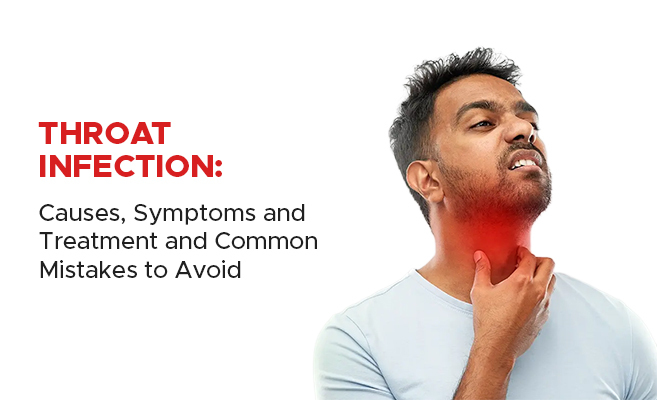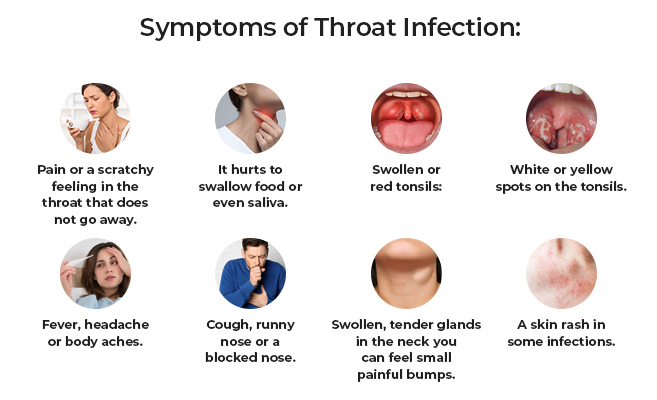Throat Infection: Causes, Symptoms and Treatment and Common Mistakes to Avoid

A throat infection means your throat or tonsils are sore, swollen or painful. Most cases are mild and get better with rest, fluids and simple home care. Some are caused by bacteria such as Group A Streptococcus (strep throat) and need testing and antibiotics. Other times the cause is a virus, reflux, allergies or smoke.
At PSRI Hospital, one of the trusted choices when people search for the best hospital in Delhi, we offer same-day throat infection diagnosis, clear advice and safe throat infection treatment when needed. Keep reading as this guide by our ENT experts explains what causes throat infections, how doctors check and test for them, the treatments that work and the common mistakes to avoid.
Throat Infection Causes
A throat infection can come from tiny germs called viruses or bacteria or from things that irritate your throat like smoke or heartburn. Here are the most common causes of throat infection:
- Viruses (most common): These are the same bugs that cause the common cold and the flu. They often have a runny nose and cough. Mono glandular fever can also cause a very sore throat.
- Bacteria: ‘Strep throat’ is a common example. It can cause higher fever, very painful swallowing and white spots on the tonsils.
- Acid reflux: Stomach acid can burn and hurt the throat.
- Allergies: Post-nasal drip from allergies can make the throat sore.
- Smoke and pollution: These irritate the throat and make it sore or scratchy.
- Overuse of the voice: Yelling or long talking can strain the throat and cause pain.
- Rare causes: Some uncommon infections for example, diphtheria or certain sexually transmitted infections can affect the throat. These are unusual and are tested only when needed.
- Weakened immunity. If your immune system is weak due to illness or some medicines you may get throat infections more often.
- Infections from animals. Very rarely, bugs from animals can cause throat problems.

Throat Infection Diagnosis and Treatment
Diagnosis
- The doctor will check your throat and neck for swollen glands.
- A throat swab is often done. This is a quick stick at the back of the throat.
- The quick test (rapid strep test or RADT) gives same-day results. If it is positive it usually means strep and your doctor will treat it.
- A negative quick test can sometimes miss bacteria. In children or when the doctor is not sure, a throat culture (a lab test that takes longer) is advised.
- If the doctor feels the infection is deep or there is a lump that could block breathing, they may use a small camera to look or do a scan.
- The doctor will also check for other causes, such as glandular fever (mono), an ear infection or irritation from reflux or allergies.
Treatment
- Home care first: Rest, drink plenty of fluids, eat mild foods and try warm salt-water gargles. Use throat lozenges if they help. Keep your mouth clean. Avoid smoking and very acidic or icy drinks if they hurt.
- Pain relief: Take paracetamol or ibuprofen as the doctor advises to lower pain and fever.
- Antibiotics: Given only if strep or another bacteria is there. Common medicines are penicillin or amoxicillin. Do not start antibiotics on your own. If prescribed, finish the full course.
- Steroid medicine: A single, advised dose can ease severe pain quickly. Steroids do not kill germs and should only be taken if a doctor recommends them.
- If there is a pocket of pus (abscess): The ENT doctor may need to drain it. This relieves pain and helps healing.
- If infections keep coming or tonsils block breathing: The doctor may suggest removing the tonsils with tonsil surgery after careful review.
- Special groups: Children, pregnant women and those with weak immunity need tests and medicines chosen just for them. Some viral infections may be treated with antiviral medicines if the test shows they are needed.
Common Mistakes to Avoid
- Taking antibiotics without testing: Don’t start antibiotics on your own. See a doctor and get a quick throat test or lab test first.
- Stopping antibiotics early: If a doctor prescribes medicine, finish the whole course even if you feel better.
- Waiting too long for help when signs are serious: If you have trouble breathing, are drooling, cannot swallow or have a very high fever, go to the emergency room now.
- Using strong medicines without a doctor’s advice: Do not take steroid tablets or other strong drugs unless a doctor prescribes them.
- Relying only on home remedies: Home care like salt water gargles, fluids and rest is fine for mild colds. If the condition gets worse, see a doctor immediately.
- Assuming every sore throat is strep: Many sore throats are caused by viruses. Get tested before taking antibiotics.
Conclusion
Most throat infections get better with the right care. SIf your throat is painful, getting worse or not improving in a few days, the fastest way to get the right help is a proper check and test. At PSRI you can get a quick throat infection diagnosis and a clear plan for throat infection treatment so you stop guessing and start getting better.
If you are searching for the best ENT doctor in delhi or a trusted best hospital in delhi, PSRI combines experienced ENT specialists with on-site testing and follow-up care. Our team helps you understand tests, avoids unnecessary medicines and makes sure you get the right treatment for your situation.
Ready to get checked?
- Book an ENT consult now or call our appointments desk.
- If your symptoms are severe, go to the Emergency Department immediately.
Book now to get a quick throat infection diagnosis and start the right throat infection treatment.
FAQs
1. How long does a throat infection last?
Ans. Viral: 3-7 days. Bacterial strep symptom relief in 24-48 hours on antibiotics, always complete the course.
2. Is a rapid strep test reliable?
Ans. RADT is specific but can miss cases. In children a negative RADT often needs a throat culture.
3. When should a child see an ENT?
Ans. If breathing trouble, drooling, severe pain or frequent recurrent infections that affect daily life.
4. Can throat infections cause complications?
Ans. Yes, are complications include tonsillar cellulitis, abscess, otitis media, rheumatic fever and post-streptococcal glomerulonephritis.
5. What home steps help immediately?
Ans. Hydrate, rest, salt-water gargles, lozenges, acetaminophen or ibuprofen for pain, avoid smoking.

 Book An Appointment
Book An Appointment Virtual Consultation
Virtual Consultation





